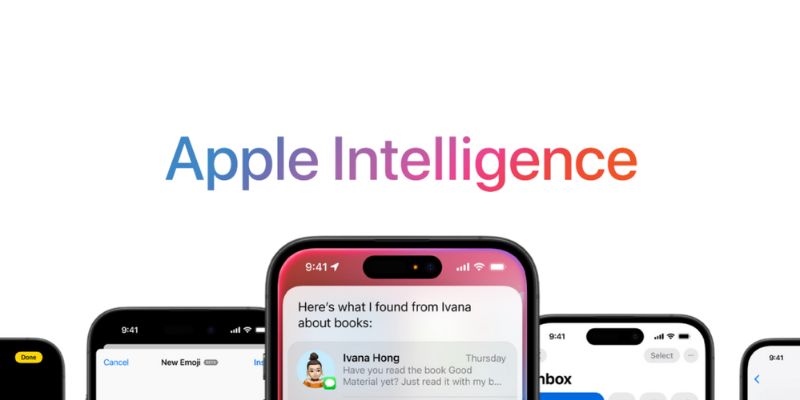Advertisement
Apple Intelligence marks a major shift in how Apple devices understand and support users. It combines generative artificial intelligence with fast, on-device processing to create more responsive and personalized experiences. Instead of relying solely on cloud-based systems, Apple balances privacy and performance at the core of its strategy. As iOS, macOS, and Siri gain AI-powered upgrades, users will experience smarter, more predictive features in everyday tasks.
Whether editing photos or composing emails, Apple Intelligence adapts to your routine. Apple stands out by blending personal context with intelligent automation. This innovation sets a new benchmark for AI integration in personal tech. As it launches across Apple products, the technology promises a future shaped by private, secure, and intelligent computing.

Apple Intelligence integrates deeply into the operating systems of iPhones, iPads, and Macs. It uses on-device processing to protect user data and deliver fast, secure experiences. The system analyzes user behavior to provide real-time, personalized recommendations across everyday tasks. Apple combines its Private Cloud Compute with proprietary silicon for more complex actions to maintain performance while safeguarding privacy.
Apple's artificial intelligence also interacts with Mail, Messages, and Safari, among other basic apps. Writing or responding offers ideas based on your style. It also sorts alerts according to personal relevance. Apple's intelligence grows and changes with time. It makes the user and the gadget one perfect fit. Unlike others, Apple wants to customize artificial intelligence, which depends on data centers. It ensures answers that seem natural and confidential. It increases the value of the experience for regular consumers. On every Apple device, it combines privacy, speed, and control.
Siri is currently being developed with Apple Intelligence. It is growing smarter, faster, and more useful. Siri picks context from apps and on-screen material. Based on what you're doing, you can probe. If you're reading an email, for instance, you may ask Siri to set a meeting from that email. Siri can also function inside apps, therefore facilitating multitasking. The voice assistant increases awareness of personal information such as places or calendar events. Apple Intelligence guides Siri toward increased responsiveness and conversational ability.
Siri grows to know your preferences and speech patterns over time. It does not feel robotic anymore. The helper now does multi-stage directions. Ask it to forward a file, then text someone the file location is at. For privacy, all these functionalities function locally. It does not need to forward everything to the cloud—users of this privacy-first design have confidence in employing artificial intelligence. Siri turns into the most individualized assistant available on the market.
The core promise of Apple Intelligence is privacy. Apple Neural Engine drives artificial intelligence capabilities on smartphones. Sensitive data resides on your Mac, iPad, or iPhone. Private Cloud Compute handles jobs requiring extra power. Apple never saves or accesses your data even then. The system runs jobs that satisfy high-security criteria only. Unlike certain artificial intelligence systems, Apple does not profile individuals for marketing. Your device knows your wants without gathering or distributing data.
Training for machine learning models teaches respect for user privacy. App permissions are still yours. You can check and control the access to AI technologies. Emails, texts, and data remain private. For openness, Apple also publishes independent security audits. Apple Intelligence raises a fresh ethical AI standard. It shows that smart assistants can be both private and powerful. Every function reflects trust, which provides users of all kinds of gadgets peace of mind.

Apple Intelligence automates common tasks across devices to boost productivity and save time. One powerful feature is its built-in writing assistance, available in apps like Notes, Mail, and Messages. Whether composing a message or drafting a professional email, the system offers context-aware suggestions. These tools save time and improve clarity without needing extra writing apps. Another standout function is image generation. Users can use simple prompts to create custom visuals in Keynote, Pages, or Messages. One can apply these on Pages, Keynote, or Messages.
Apple Intelligence also helps searches. You can ask it to find pictures from particular vacations or dates rather than looking everywhere. You may even ask it to retrieve records you spoke about with a specific person. These naturally occurring chores save time. Apple also creates simpler app actions. You may say, "Show my last grocery list." Notes will open. These tools cut the time spent looking among several applications or tapping.
Apple Intelligence pursues a different route than other artificial intelligence products. Built into the Apple ecosystem rather than functioning as stand-alone software, Programs like Google Gemini and ChatGPT depend on cloud servers. Apple handles most chores using on-device processing. It increases privacy and cuts latency. Apple stresses daily use, while others provide open-ended cues. Emails, scheduling, and personalizing are among its AI aids. You do need to download other programs or visit a website.
Apple's artificial intelligence picks your context more precisely. It employs personal information without revealing it. Many times, accuracy on other platforms depends on user data. Apple shares no user history or stores it for ad targeting. It softly improves over time in the backdrop. There is no learning curve, and the interface stays recognizable. Apple also stresses compatibility. Its artificial intelligence operates through Messages, Images, Safari, and more. It makes Apple Intelligence more sensible for consumers who are already part of the Apple ecosystem.
Apple Intelligence is redefining what users expect from personal technology. It offers intelligent features while maintaining strong privacy protections. By combining local processing with generative AI, Apple enhances everyday tasks without compromising data security. It transforms Siri into a smart, reliable assistant that adapts to context and user needs. From writing emails to managing app workflows, AI quietly improves the user experience. Apple's privacy-first approach sets it apart. As it evolves, Apple Intelligence may shape the next wave of trusted, secure, and useful artificial intelligence in consumer tech.
Advertisement

If any variable is missing, do not drop the data; instead, you can easily analyze individual data using the functions with R

Why analytics is important for better outcomes across industries. Learn how data insights improve decision quality and make everyday choices more effective

Discover the top eight ChatGPT prompts to create stunning social media graphics and boost your brand's visual identity.

How AI-powered genome engineering is advancing food security, with highlights and key discussions from AWS Summit London on resilient crops and sustainable farming

How MetaGPT is reshaping AI-powered web development by simulating a full virtual software team, cutting time and effort while improving output quality

How a groundbreaking AI model for robotic arms is transforming automation with smarter, more adaptive performance across industries

What loss functions are, why they matter, and how they guide machine learning models to make better predictions. A beginner-friendly explanation with examples and insights

Google debuts new tools and an agent protocol to simplify the creation and management of AI-powered agents.

Discover powerful yet lesser-known ChatGPT prompts and commands that top professionals use to save time, boost productivity, and deliver expert results

How the latest PayPal AI features are changing the way people handle online payments. From smart assistants to real-time fraud detection, PayPal is using AI to simplify and secure digital transactions

How Locally Linear Embedding helps simplify high-dimensional data by preserving local structure and revealing hidden patterns without forcing assumptions

How to write a custom loss function in TensorFlow with this clear, step-by-step guide. Perfect for beginners who want to create tailored loss functions for their models